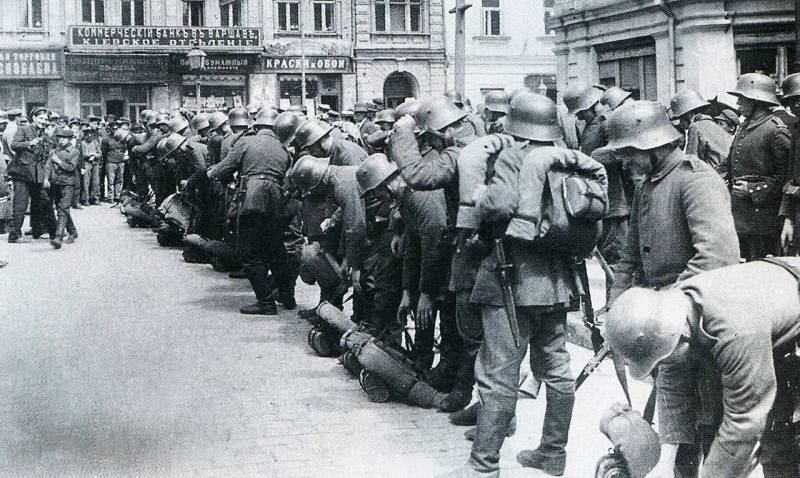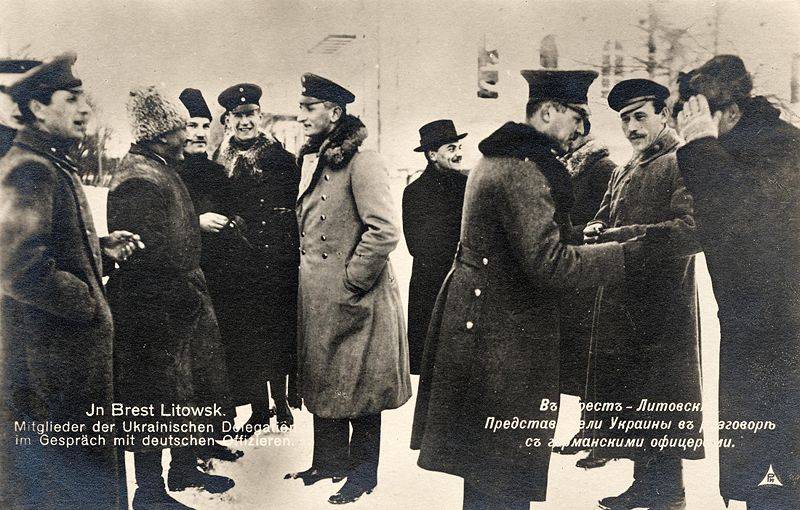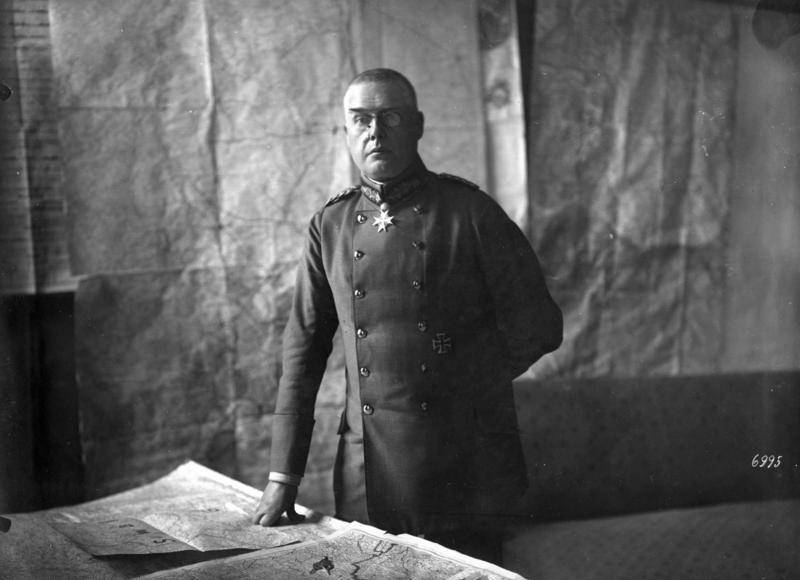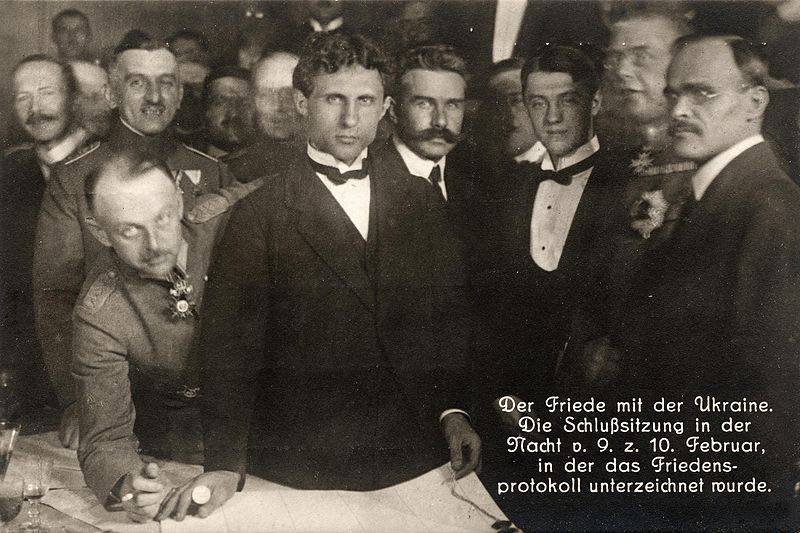"Foreigners will help us!" How the Rada sold Russian Ukraine to the Germans

German troops enter Kyiv. March 1918
Leaving Kyiv, the Rada fled to Zhytomyr, then to Polissya and further to the front, hoping for the support of the Germans. The Ukrainian “government” has one last hope: “Foreigners will help us, the West is with us!”
General situation
On January 27 (February 9), 1918, Kyiv was completely occupied by Soviet troops under the command of Muravyov (The myth of 300 "Ukrainian Spartans" who stood in the way of the Bolshevik hordes). The day before, on the night of January 25-26 (February 7–8), the Ukrainian government and the remnants of the UNR troops fled Kyiv. At the same time, when the "national heroes" scrambled from the capital, they threw weapon. In particular, the people of Kiev found that public toilets in the city center were full of rifles. The "brave Cossacks" were embarrassed to throw their weapons in front of their comrades. They went to relieve themselves and left their rifles there. Most of the Gaidamaks simply fled to their homes and provinces, stuck to the gangs.
On January 30 (February 12), the Central Executive Committee of Soviet Ukraine and the People's Secretariat moved to Kyiv from Kharkov. The head of the Southern Revolutionary Front, Antonov-Ovseenko, reported on the successes of his troops:
Meanwhile, the Rada fled to Zhytomyr, the center of the Volyn province. The province was predominantly peasant, there were no industrial centers where the positions of the Bolsheviks were strong. In fact, the Rada no longer controlled anything in the southern Russian outskirts of Ukraine. The representatives of the Ukrainian "authority" themselves constantly quarreled and squabbled among themselves, continued to intrigue. In the localities, the power of the Rada was not recognized and they simply “walked”, robbed everything that was possible.
The report of the headquarters of the German Eastern Front described the situation as follows:
Already on January 30 (February 12), 1918, the Ukrainian "government" fled from Zhytomyr to the north-west - to remote Polesie, counting on the help of units of the Polish Corps, which had rebelled against the Bolsheviks in Belarus. Then the Rada and the Ukrainian command fled further to the west - to Sarny, to the very front, hoping for the support of the Germans.
The Rada had one last hope: “Foreigners will help us, the West is with us!”
In February 1918, a new UNR delegation headed by Alexander Sevryuk went to Brest. The Austrians and Germans knew that the Reds controlled the main centers of Little Russia, including Kyiv and Odessa. That formally autonomous Ukraine is still part of Russia. That the Rada has no power in the Ukraine, they are inferior even to various atamans and fathers (leaders of proliferating gangs).
However, the German bloc was not up to formalities, the situation was critical. Berlin and Vienna were losing the war, peace in the East and the resources of Russia, including Little Russia, were urgently needed. It was necessary to urgently transfer divisions from the Russian front to the Western. Bread, livestock, coal and gold were required. Food riots were already beginning in the Austro-Hungarian Empire. The Germans also looked at the Ukrainian delegation as a means of putting pressure on the delegation of Soviet Russia.
Therefore, German politicians and the military were ready to support any government in Ukraine that would sign peace and grant them rights to the resources of the Russian land. The Ukrainian Petrushki, who have no power, also approached. The Germans soberly looked at the Ukrainians. The report of the headquarters of the Eastern Front also noted:

Delegates from the UNR and the Central Powers
Talks
The chief of staff of the Eastern Front, General Max Hoffmann, who actually negotiated in Brest-Litovsk, noted:
At the same time, the “young Ukrainians” constantly argued, bickered and showed impudence at the slightest pretext. Having nothing for their souls, Ukrainian diplomats demanded that the Kholm region (part of Poland, which was occupied by German troops), Bukovina and Eastern Galicia with its capital in Lemberg-Lvov (belonged to the Austrians) be transferred to the UNR. The Austrians were ready to cede only the Kholm region. Kholmsk province was created in 1912. The region was small - it had only 8 counties, in the city of Kholm - in 1913, about 24 thousand people lived. 758 thousand people lived in the province, of which approximately 300 thousand Orthodox and Catholics each (some were Russians who converted to Catholicism), the rest were Jews. The Polish side vigorously protested against the transfer of the Kholmshchyna to the Ukraine.
Also, the Ukrainian delegation claimed Brest and part of the Minsk and Grodno provinces. The Germans refused to support these demands, since there were no "Ukrainians" there. The Germans agreed only to Brest.
It is worth noting that in Bukovina and Eastern Galicia, the population at that time was dominated by Rusyns-Russians, who considered themselves part of the Russian ethnos. They did not consider themselves "Ukrainians", who at that time were a fictional, mythical people (like elves and orcs).
An insignificant stratum of intellectuals adhered to the Ukrainophile orientation. At the same time, they spoke and thought in Russian, were Russian from birth, and only tried to create and implement the “Ukrainian language” created on their knees - a mixture of South Russian dialects, Polish, German and invented, artificial words (How the population of Little Russia rejected the foreign and artificial "Ukrainian language").
During the First World War, the Austrian authorities launched a real offensive against the Russian population of Galicia (The history of the destruction of Russian Galicia). The information war against Russian residents was accompanied there by large-scale repressions, real terror, when many thousands of people were killed, thrown into prisons, concentration camps, where they were starved to death, disease, or expelled from their homes, depriving them of all their property. Active assistance to the Austrians was provided by Ukrainian nationalists, who were then called the Mazepins, and the Poles.
Thus, in 1914-1918. the Austrians, with the support of Ukrainian and Polish nationalists, carried out the genocide of the Russian population of Carpathian and Galician Rus, Bukovina.

Chief of Staff of the Eastern Front General Max Hoffmann (Max Hoffmann)
"Bread World"
The pragmatic Germans delayed the signing of the agreement. They did not want to make peace with the Rada, which had no power, territory or army. However, the situation on the Western Front and the food crisis urged on the Central Powers. On January 27 (February 9), 1918, the Germans signed peace with the delegation of the Central Rada. On the part of the UNR, the agreement was signed by a half-educated student of the St. Petersburg Institute of Technology, Social Revolutionary Alexander Sevryuk.
The Germans called this agreement Brotfrieden - "bread peace". In exchange for military assistance against the Bolsheviks, the UNR undertook to supply the German and Austro-Hungarian empires by the end of July 1918 with 1 million tons of grain, 400 million eggs, up to 50 thousand tons of cattle meat, lard, sugar, hemp, manganese ore, etc.
The borders with Austria remained pre-war, to the north, in the current Lublin and Mazowieckie voivodeships, the Brest region, the borders were to be determined by a mixed commission, taking into account the ethnic composition and interests of the population. Austria-Hungary undertook to create Ukrainian autonomy in Eastern Galicia and Bukovina (the Austrians abandoned this decision in July).
On January 31 (February 13), 1918, Ukrainian politicians turned to Germany and Austria-Hungary with a request for help from the UNR against the Bolsheviks. The German high command gave its preliminary consent to enter the war against the Bolsheviks and began to actively prepare for an offensive in the southern strategic direction. The Germans already on January 5 (18) decided to launch an offensive in the Petrograd direction.
On January 31 (February 13), a meeting of Kaiser Wilhelm II with ministers and military command took place in Hamburg, at which the issue of resuming hostilities against Russia was to be finally resolved. Ludendorff, considering the possibility of waging a war on two fronts, wrote in a memorandum addressed to the emperor:
... We, perhaps, will inflict a mortal blow on the Bolsheviks and strengthen our internal political position ... we will free up large forces in the East for a big blow, which ... is urgently needed in the West ... "
As a result, the German top military-political leadership decides to destroy the "center of the revolutionary plague." Germany and Austria-Hungary planned a large-scale offensive from the Baltic to the Carpathians. Turkish troops were advancing in the Caucasus.

The participants in the negotiations in Brest, from left to right: General Brinkmann, Nikolai Lyubinsky, Nikolai Levitsky, Alexander Sevryuk, Max Hoffmann and Sergiy Ostapenko
Information